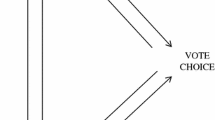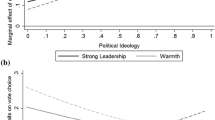Abstract
The study compared the relationships between voting preferences and two predictors: voters' ideological position and the perceived charisma of political leaders, under two conditions: partisan elections and personal elections. It also examined whether these relationships are moderated by the ideological extremity of the parties standing for election and by voters' personal disposition to ascribe importance to leadership. The study was carried out a short time before the last general elections in Israel. Two comparable samples were used: one focused on relatively moderate parties and their leaders, and the other on more extreme parties and leaders. In both samples, voters' ideological position was strongly related to leaders' perceived charisma and to voting preferences, but leaders' perceived charisma added significantly to the prediction of voting preferences, especially under conditions of personal elections. In combination, voters' ideological position and leaders' charisma perceptions predicted voting preferences very accurately. These relationships were not affected by the two hypothesized moderators.
Similar content being viewed by others
References
Ajzen, I., and M. Fishbein (1980).Understanding Attitudes and Predicting Social Behavior. Englewood Cliffs, NJ: Prentice Hall.
Bass, B. M. (1985).Leadership and Performance Beyond Expectations. New York: The Free Press.
Bass, B. M. (1990).Bass & Stogdill's Handbook of Leadership: Theory, Research and Applications, 3rd ed. New York: The Free Press.
Conger, J. A., and R. N. Kanungo (1987). Toward a behavioral theory of charismatic leadership in organizations.Academy of Management Review 12: 637–647.
Conger, J. A., and R. N. Kanungo (1990). A behavioral attribute measure of charismatic leadership in organizations. Paper presented at the Academy of Management Annual Conference, San Francisco, August 11–15.
House, R. J. (1977). A 1976 theory of charismatic leadership. In J. G. Hunt and L. L. Larson (eds.),Leadership: The Cutting Edge. Carbondale, IL: Southern Illinois University Press.
Kets de Vries, M. F. R. (1988). Prisoners of leadership.Human Relations 41(3): 261–280.
Kinder, D. R., and D. O. Sears (1985). Public opinion and political action. In L. Gardner and E. Aronson (eds.),Handbook of Social Psychology, 3rd ed. New York: Random House.
Klecka, W. R. (1980).Discriminant Analysis. Beverly Hills, CA: Sage.
Knight, K. (1985). Ideology in the 1980 election: Ideological sophistication does matter.Journal of Politics 47: 828–853.
Meindl, J. R. (1990). On leadership: An alternative to the conventional wisdom. In L. L. Cummings and B. Staw (eds.),Research in Organizational Behavior 12: 159–203.
Miller, A. H., M. P. Wattenberg, and O. Malanchuk (1986). Schematic assessments of presidential candidates.American Political Science Review 80(2): 521–539.
Shamir, B. (1991) The charismatic relationship: Alternative explanations and predictions.Leadership Quarterly 2: 81–104.
Shamir, B. (1992). Attribution of charisma and influence to the leader: The romance of leadership revisited.Journal of Applied Social Psychology 22(5): 386–407.
Shamir, B., R. J. House, and M. B. Arthur (1993). The motivational effects of charismatic leadership: A self-concept based theory,Organization Science, 4(4): 577–594.
Willner, A. R. (1984).The Spellbinders: Charismatic Political Leadership. New Haven, CT: Yale University Press.
Author information
Authors and Affiliations
Additional information
The assistance of Amos Chividaly in data analysis is gratefully acknowledged.
Rights and permissions
About this article
Cite this article
Shamir, B. Ideological position, leaders' charisma, and voting preferences: Personal vs. partisan elections. Polit Behav 16, 265–287 (1994). https://doi.org/10.1007/BF01498880
Issue Date:
DOI: https://doi.org/10.1007/BF01498880




